Power and Authority: Analysis of Organizational Dynamics
VerifiedAdded on 2020/02/18
|18
|4640
|42
Report
AI Summary
This report provides a comprehensive analysis of power and authority within organizational contexts. It begins by defining authority, exploring its importance, and outlining various forms such as line, staff, and team authority. The report then details the delegation of authority, outlining key steps for effective implementation. It subsequently defines power, highlighting its significance and exploring diverse sources like legitimate, coercive, reward, and expert power. Techniques for influencing others through power are also discussed. The report differentiates between power and authority, emphasizing their similarities and differences. The conclusion synthesizes the key insights and implications of power and authority for effective leadership and organizational management.
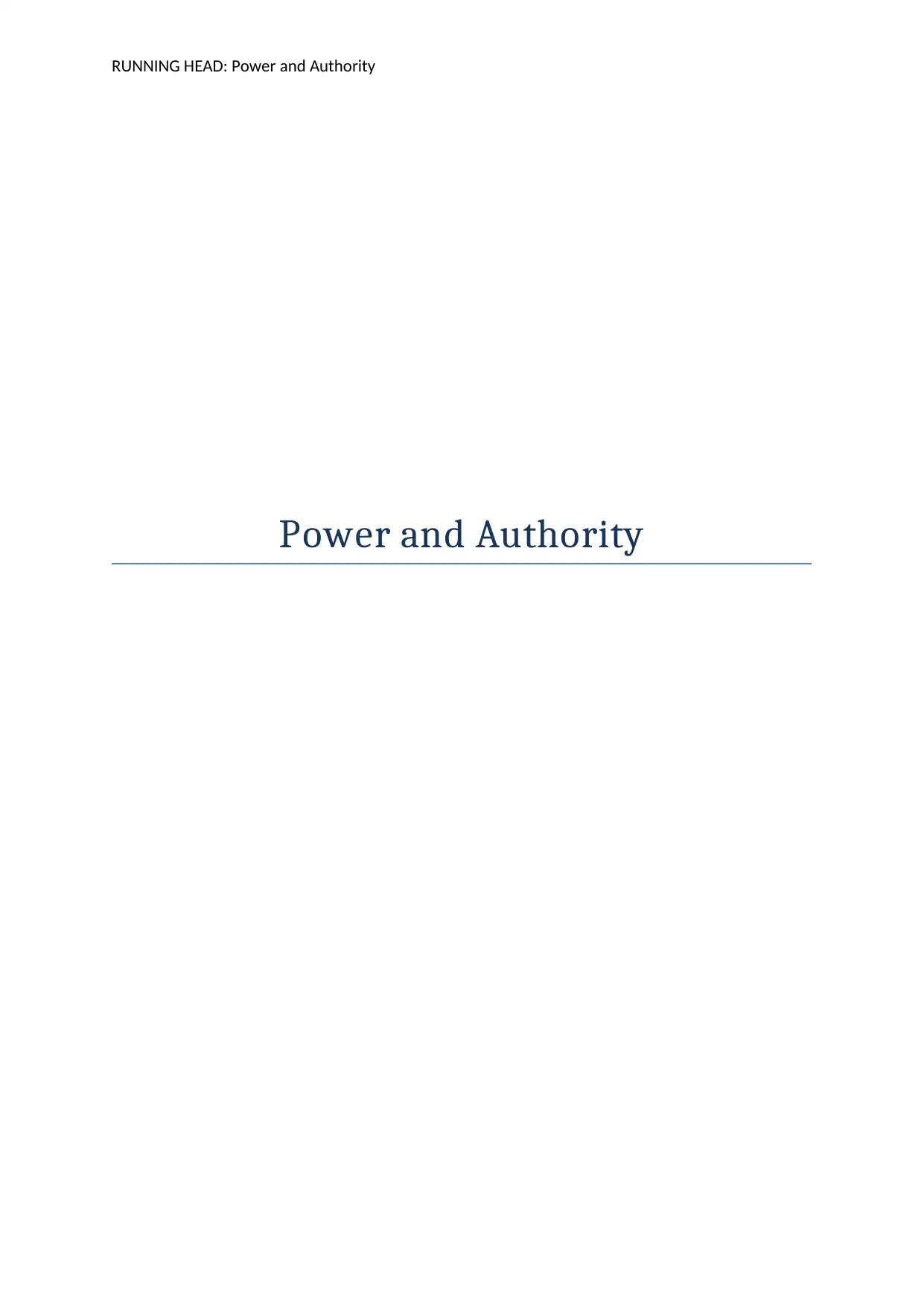
RUNNING HEAD: Power and Authority
Power and Authority
Power and Authority
Paraphrase This Document
Need a fresh take? Get an instant paraphrase of this document with our AI Paraphraser
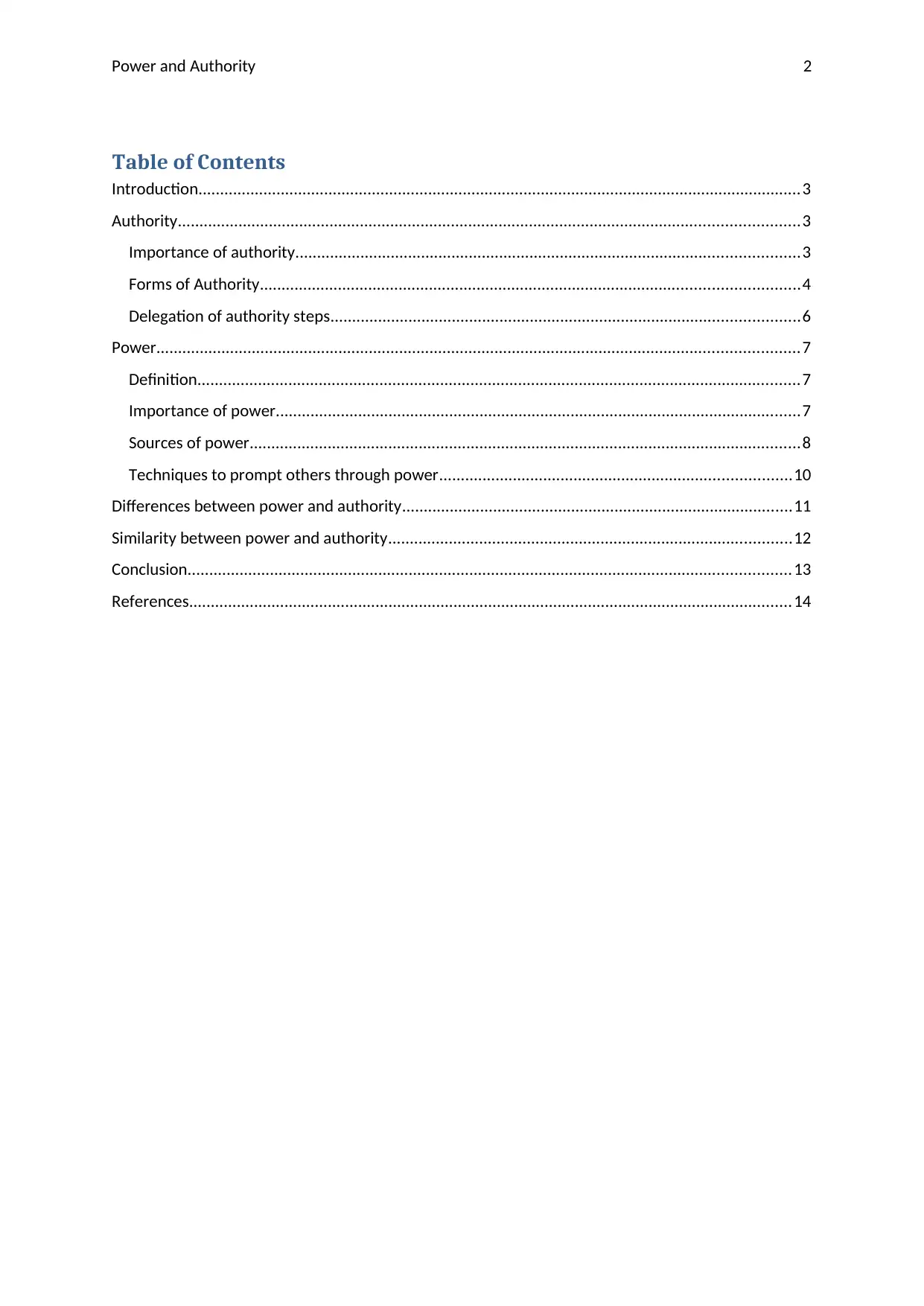
Power and Authority 2
Table of Contents
Introduction...........................................................................................................................................3
Authority...............................................................................................................................................3
Importance of authority....................................................................................................................3
Forms of Authority............................................................................................................................4
Delegation of authority steps............................................................................................................6
Power....................................................................................................................................................7
Definition...........................................................................................................................................7
Importance of power.........................................................................................................................7
Sources of power...............................................................................................................................8
Techniques to prompt others through power.................................................................................10
Differences between power and authority..........................................................................................11
Similarity between power and authority.............................................................................................12
Conclusion...........................................................................................................................................13
References...........................................................................................................................................14
Table of Contents
Introduction...........................................................................................................................................3
Authority...............................................................................................................................................3
Importance of authority....................................................................................................................3
Forms of Authority............................................................................................................................4
Delegation of authority steps............................................................................................................6
Power....................................................................................................................................................7
Definition...........................................................................................................................................7
Importance of power.........................................................................................................................7
Sources of power...............................................................................................................................8
Techniques to prompt others through power.................................................................................10
Differences between power and authority..........................................................................................11
Similarity between power and authority.............................................................................................12
Conclusion...........................................................................................................................................13
References...........................................................................................................................................14
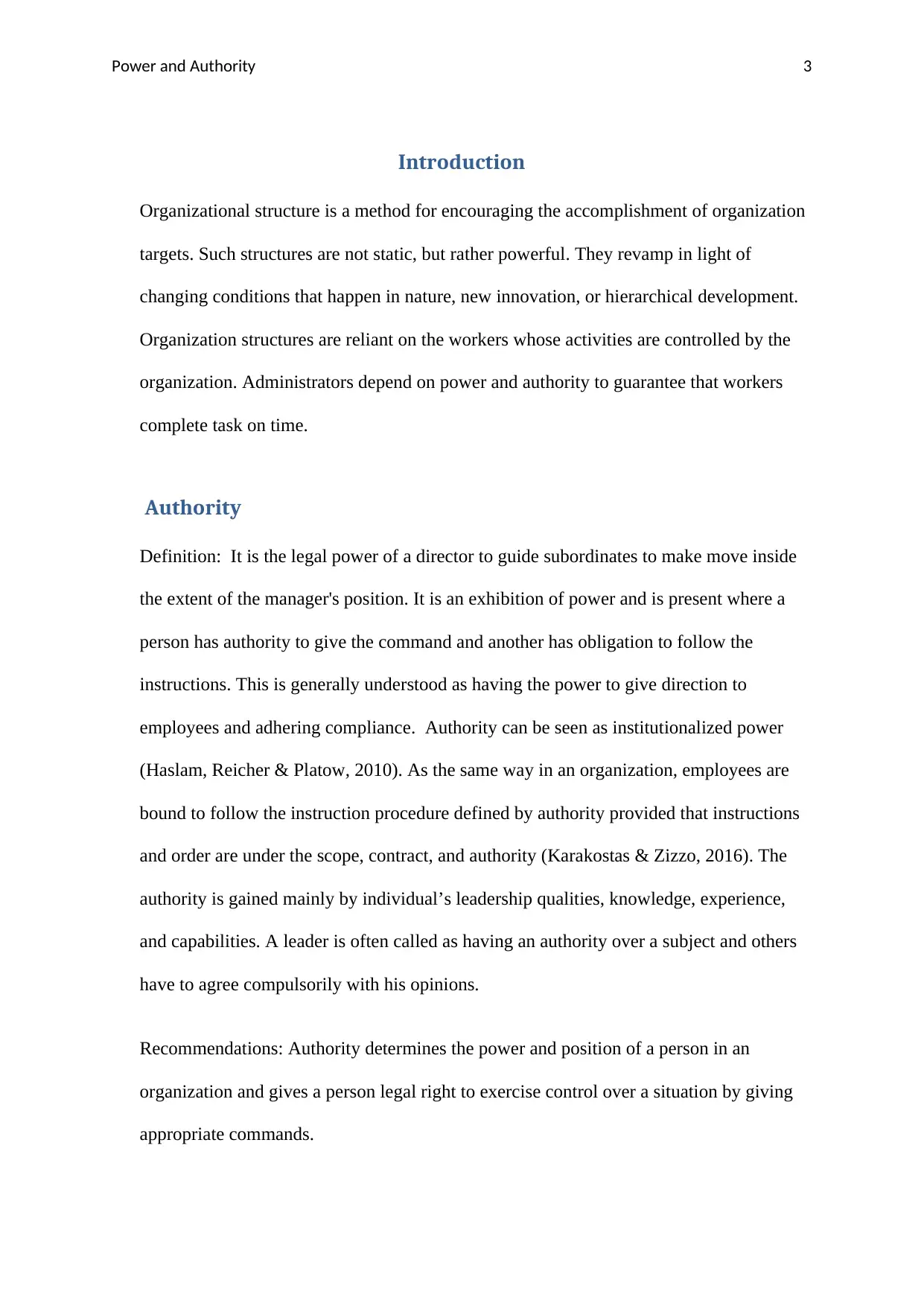
Power and Authority 3
Introduction
Organizational structure is a method for encouraging the accomplishment of organization
targets. Such structures are not static, but rather powerful. They revamp in light of
changing conditions that happen in nature, new innovation, or hierarchical development.
Organization structures are reliant on the workers whose activities are controlled by the
organization. Administrators depend on power and authority to guarantee that workers
complete task on time.
Authority
Definition: It is the legal power of a director to guide subordinates to make move inside
the extent of the manager's position. It is an exhibition of power and is present where a
person has authority to give the command and another has obligation to follow the
instructions. This is generally understood as having the power to give direction to
employees and adhering compliance. Authority can be seen as institutionalized power
(Haslam, Reicher & Platow, 2010). As the same way in an organization, employees are
bound to follow the instruction procedure defined by authority provided that instructions
and order are under the scope, contract, and authority (Karakostas & Zizzo, 2016). The
authority is gained mainly by individual’s leadership qualities, knowledge, experience,
and capabilities. A leader is often called as having an authority over a subject and others
have to agree compulsorily with his opinions.
Recommendations: Authority determines the power and position of a person in an
organization and gives a person legal right to exercise control over a situation by giving
appropriate commands.
Introduction
Organizational structure is a method for encouraging the accomplishment of organization
targets. Such structures are not static, but rather powerful. They revamp in light of
changing conditions that happen in nature, new innovation, or hierarchical development.
Organization structures are reliant on the workers whose activities are controlled by the
organization. Administrators depend on power and authority to guarantee that workers
complete task on time.
Authority
Definition: It is the legal power of a director to guide subordinates to make move inside
the extent of the manager's position. It is an exhibition of power and is present where a
person has authority to give the command and another has obligation to follow the
instructions. This is generally understood as having the power to give direction to
employees and adhering compliance. Authority can be seen as institutionalized power
(Haslam, Reicher & Platow, 2010). As the same way in an organization, employees are
bound to follow the instruction procedure defined by authority provided that instructions
and order are under the scope, contract, and authority (Karakostas & Zizzo, 2016). The
authority is gained mainly by individual’s leadership qualities, knowledge, experience,
and capabilities. A leader is often called as having an authority over a subject and others
have to agree compulsorily with his opinions.
Recommendations: Authority determines the power and position of a person in an
organization and gives a person legal right to exercise control over a situation by giving
appropriate commands.
⊘ This is a preview!⊘
Do you want full access?
Subscribe today to unlock all pages.

Trusted by 1+ million students worldwide
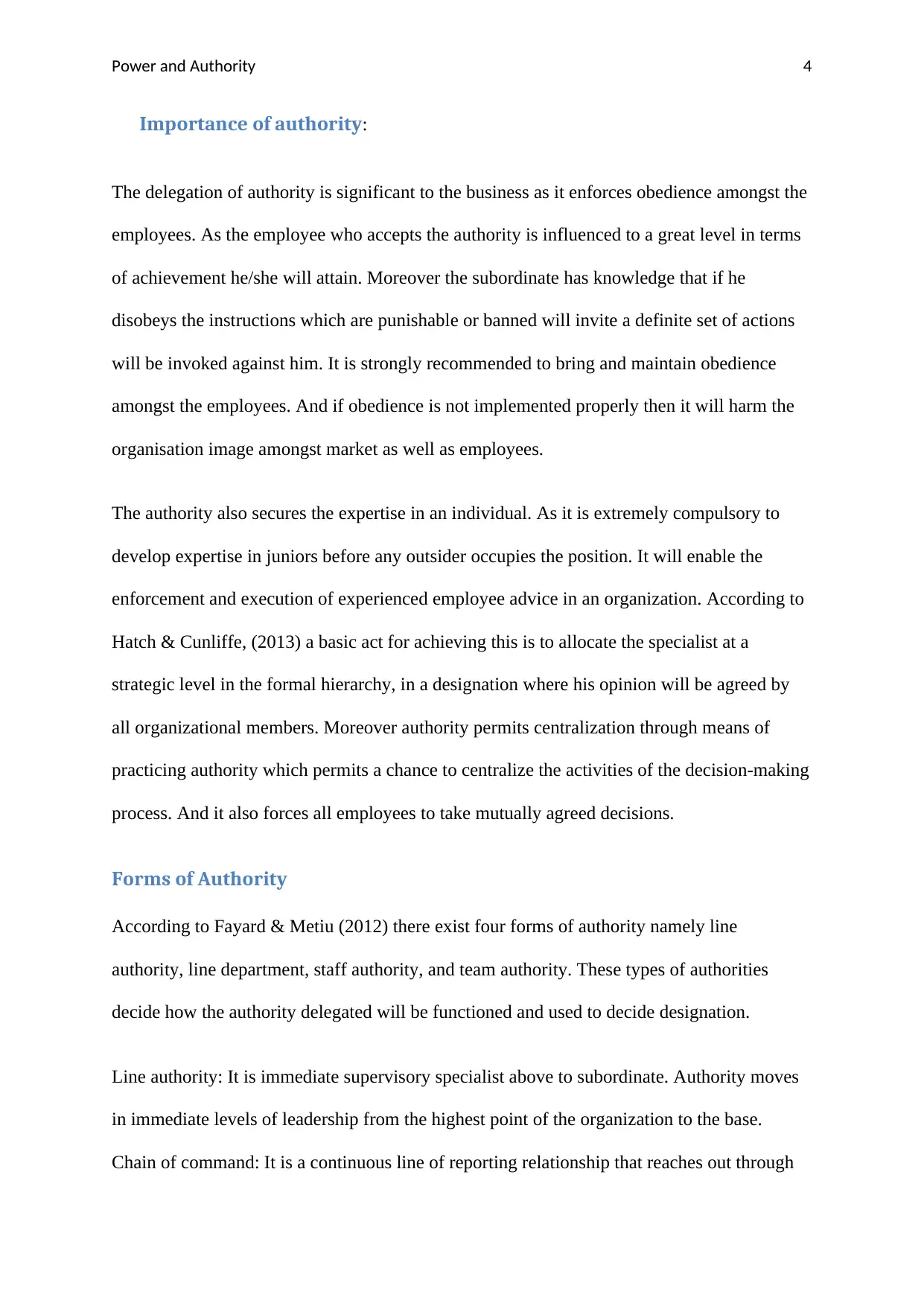
Power and Authority 4
Importance of authority:
The delegation of authority is significant to the business as it enforces obedience amongst the
employees. As the employee who accepts the authority is influenced to a great level in terms
of achievement he/she will attain. Moreover the subordinate has knowledge that if he
disobeys the instructions which are punishable or banned will invite a definite set of actions
will be invoked against him. It is strongly recommended to bring and maintain obedience
amongst the employees. And if obedience is not implemented properly then it will harm the
organisation image amongst market as well as employees.
The authority also secures the expertise in an individual. As it is extremely compulsory to
develop expertise in juniors before any outsider occupies the position. It will enable the
enforcement and execution of experienced employee advice in an organization. According to
Hatch & Cunliffe, (2013) a basic act for achieving this is to allocate the specialist at a
strategic level in the formal hierarchy, in a designation where his opinion will be agreed by
all organizational members. Moreover authority permits centralization through means of
practicing authority which permits a chance to centralize the activities of the decision-making
process. And it also forces all employees to take mutually agreed decisions.
Forms of Authority
According to Fayard & Metiu (2012) there exist four forms of authority namely line
authority, line department, staff authority, and team authority. These types of authorities
decide how the authority delegated will be functioned and used to decide designation.
Line authority: It is immediate supervisory specialist above to subordinate. Authority moves
in immediate levels of leadership from the highest point of the organization to the base.
Chain of command: It is a continuous line of reporting relationship that reaches out through
Importance of authority:
The delegation of authority is significant to the business as it enforces obedience amongst the
employees. As the employee who accepts the authority is influenced to a great level in terms
of achievement he/she will attain. Moreover the subordinate has knowledge that if he
disobeys the instructions which are punishable or banned will invite a definite set of actions
will be invoked against him. It is strongly recommended to bring and maintain obedience
amongst the employees. And if obedience is not implemented properly then it will harm the
organisation image amongst market as well as employees.
The authority also secures the expertise in an individual. As it is extremely compulsory to
develop expertise in juniors before any outsider occupies the position. It will enable the
enforcement and execution of experienced employee advice in an organization. According to
Hatch & Cunliffe, (2013) a basic act for achieving this is to allocate the specialist at a
strategic level in the formal hierarchy, in a designation where his opinion will be agreed by
all organizational members. Moreover authority permits centralization through means of
practicing authority which permits a chance to centralize the activities of the decision-making
process. And it also forces all employees to take mutually agreed decisions.
Forms of Authority
According to Fayard & Metiu (2012) there exist four forms of authority namely line
authority, line department, staff authority, and team authority. These types of authorities
decide how the authority delegated will be functioned and used to decide designation.
Line authority: It is immediate supervisory specialist above to subordinate. Authority moves
in immediate levels of leadership from the highest point of the organization to the base.
Chain of command: It is a continuous line of reporting relationship that reaches out through
Paraphrase This Document
Need a fresh take? Get an instant paraphrase of this document with our AI Paraphraser
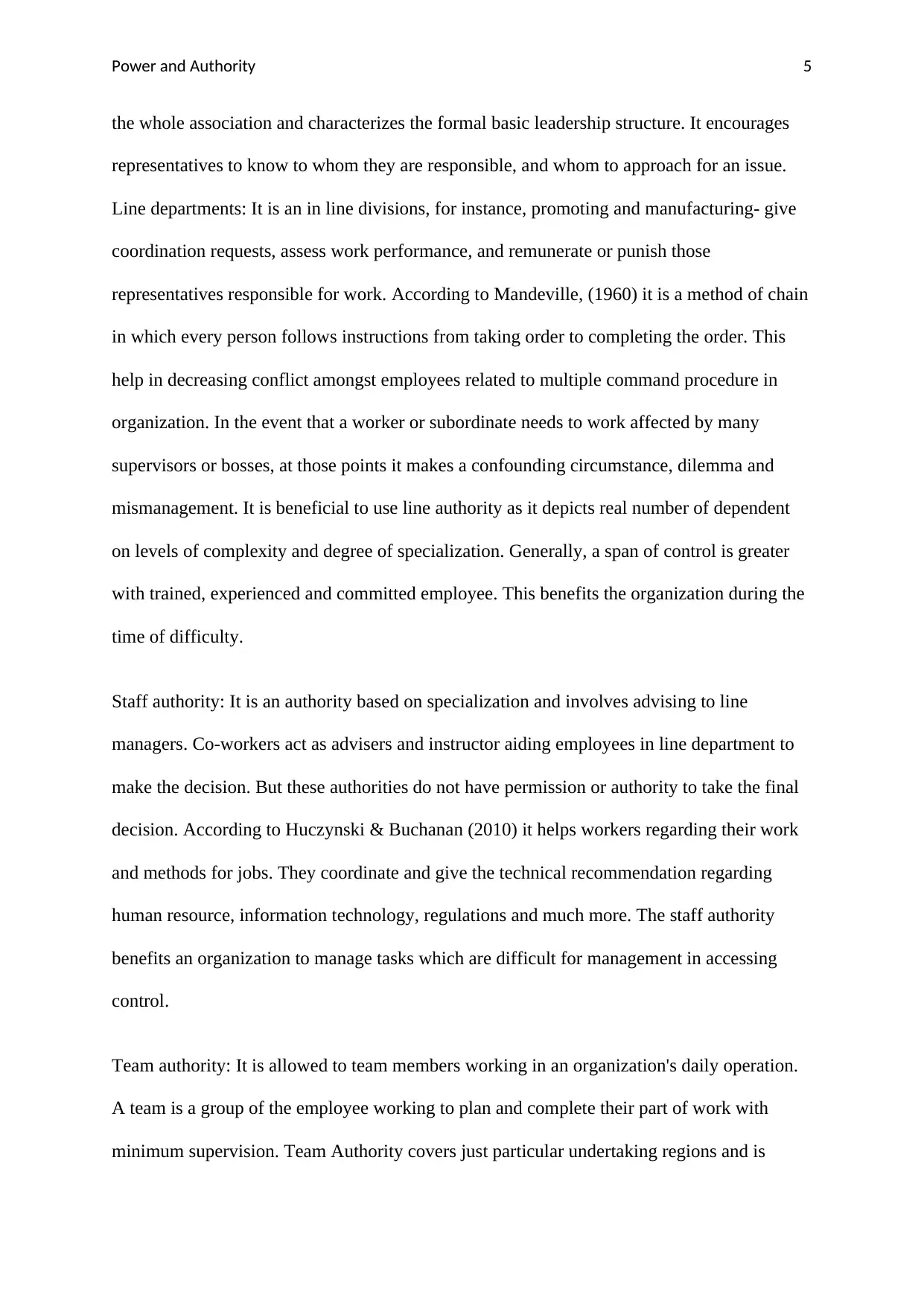
Power and Authority 5
the whole association and characterizes the formal basic leadership structure. It encourages
representatives to know to whom they are responsible, and whom to approach for an issue.
Line departments: It is an in line divisions, for instance, promoting and manufacturing- give
coordination requests, assess work performance, and remunerate or punish those
representatives responsible for work. According to Mandeville, (1960) it is a method of chain
in which every person follows instructions from taking order to completing the order. This
help in decreasing conflict amongst employees related to multiple command procedure in
organization. In the event that a worker or subordinate needs to work affected by many
supervisors or bosses, at those points it makes a confounding circumstance, dilemma and
mismanagement. It is beneficial to use line authority as it depicts real number of dependent
on levels of complexity and degree of specialization. Generally, a span of control is greater
with trained, experienced and committed employee. This benefits the organization during the
time of difficulty.
Staff authority: It is an authority based on specialization and involves advising to line
managers. Co-workers act as advisers and instructor aiding employees in line department to
make the decision. But these authorities do not have permission or authority to take the final
decision. According to Huczynski & Buchanan (2010) it helps workers regarding their work
and methods for jobs. They coordinate and give the technical recommendation regarding
human resource, information technology, regulations and much more. The staff authority
benefits an organization to manage tasks which are difficult for management in accessing
control.
Team authority: It is allowed to team members working in an organization's daily operation.
A team is a group of the employee working to plan and complete their part of work with
minimum supervision. Team Authority covers just particular undertaking regions and is
the whole association and characterizes the formal basic leadership structure. It encourages
representatives to know to whom they are responsible, and whom to approach for an issue.
Line departments: It is an in line divisions, for instance, promoting and manufacturing- give
coordination requests, assess work performance, and remunerate or punish those
representatives responsible for work. According to Mandeville, (1960) it is a method of chain
in which every person follows instructions from taking order to completing the order. This
help in decreasing conflict amongst employees related to multiple command procedure in
organization. In the event that a worker or subordinate needs to work affected by many
supervisors or bosses, at those points it makes a confounding circumstance, dilemma and
mismanagement. It is beneficial to use line authority as it depicts real number of dependent
on levels of complexity and degree of specialization. Generally, a span of control is greater
with trained, experienced and committed employee. This benefits the organization during the
time of difficulty.
Staff authority: It is an authority based on specialization and involves advising to line
managers. Co-workers act as advisers and instructor aiding employees in line department to
make the decision. But these authorities do not have permission or authority to take the final
decision. According to Huczynski & Buchanan (2010) it helps workers regarding their work
and methods for jobs. They coordinate and give the technical recommendation regarding
human resource, information technology, regulations and much more. The staff authority
benefits an organization to manage tasks which are difficult for management in accessing
control.
Team authority: It is allowed to team members working in an organization's daily operation.
A team is a group of the employee working to plan and complete their part of work with
minimum supervision. Team Authority covers just particular undertaking regions and is
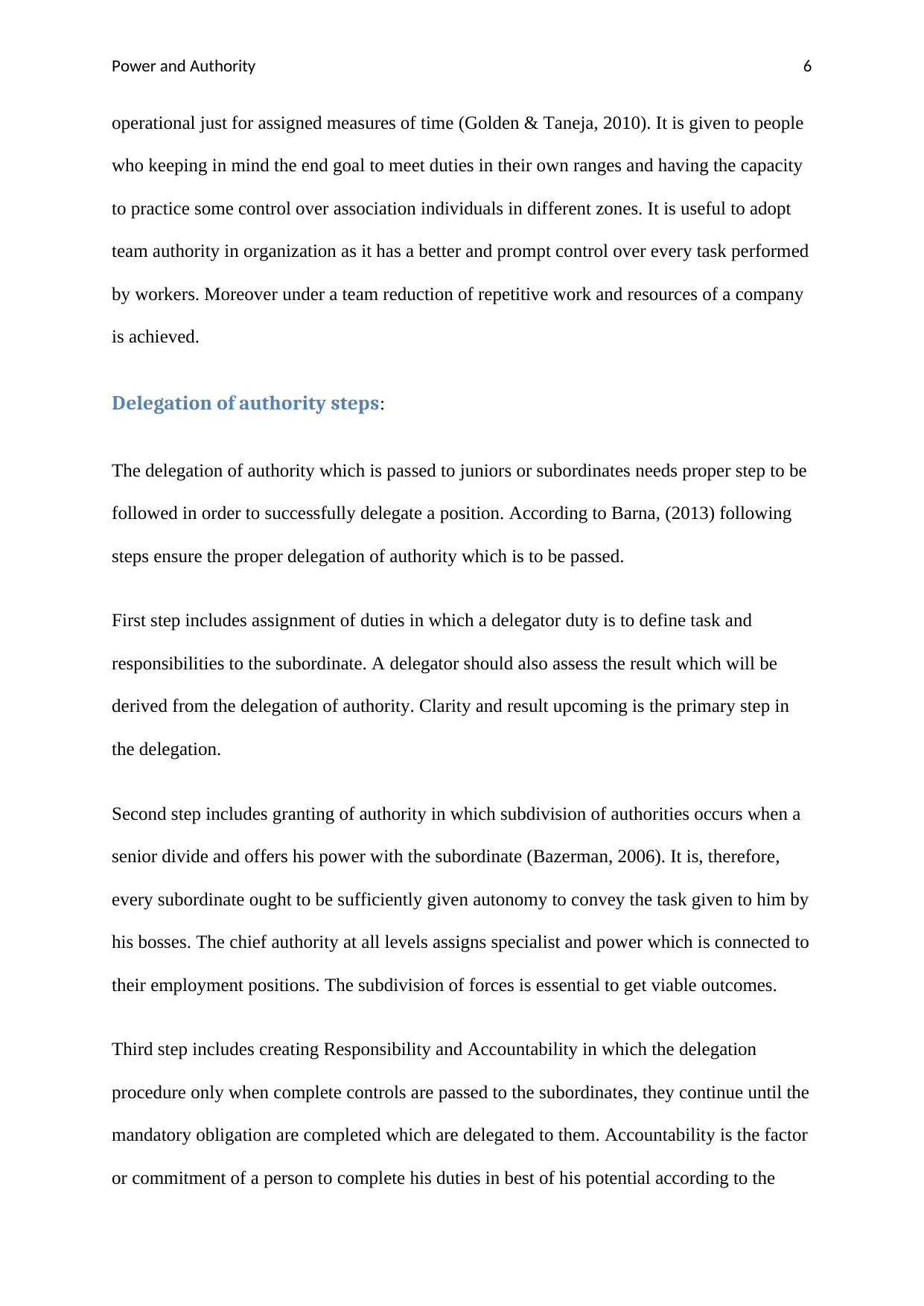
Power and Authority 6
operational just for assigned measures of time (Golden & Taneja, 2010). It is given to people
who keeping in mind the end goal to meet duties in their own ranges and having the capacity
to practice some control over association individuals in different zones. It is useful to adopt
team authority in organization as it has a better and prompt control over every task performed
by workers. Moreover under a team reduction of repetitive work and resources of a company
is achieved.
Delegation of authority steps:
The delegation of authority which is passed to juniors or subordinates needs proper step to be
followed in order to successfully delegate a position. According to Barna, (2013) following
steps ensure the proper delegation of authority which is to be passed.
First step includes assignment of duties in which a delegator duty is to define task and
responsibilities to the subordinate. A delegator should also assess the result which will be
derived from the delegation of authority. Clarity and result upcoming is the primary step in
the delegation.
Second step includes granting of authority in which subdivision of authorities occurs when a
senior divide and offers his power with the subordinate (Bazerman, 2006). It is, therefore,
every subordinate ought to be sufficiently given autonomy to convey the task given to him by
his bosses. The chief authority at all levels assigns specialist and power which is connected to
their employment positions. The subdivision of forces is essential to get viable outcomes.
Third step includes creating Responsibility and Accountability in which the delegation
procedure only when complete controls are passed to the subordinates, they continue until the
mandatory obligation are completed which are delegated to them. Accountability is the factor
or commitment of a person to complete his duties in best of his potential according to the
operational just for assigned measures of time (Golden & Taneja, 2010). It is given to people
who keeping in mind the end goal to meet duties in their own ranges and having the capacity
to practice some control over association individuals in different zones. It is useful to adopt
team authority in organization as it has a better and prompt control over every task performed
by workers. Moreover under a team reduction of repetitive work and resources of a company
is achieved.
Delegation of authority steps:
The delegation of authority which is passed to juniors or subordinates needs proper step to be
followed in order to successfully delegate a position. According to Barna, (2013) following
steps ensure the proper delegation of authority which is to be passed.
First step includes assignment of duties in which a delegator duty is to define task and
responsibilities to the subordinate. A delegator should also assess the result which will be
derived from the delegation of authority. Clarity and result upcoming is the primary step in
the delegation.
Second step includes granting of authority in which subdivision of authorities occurs when a
senior divide and offers his power with the subordinate (Bazerman, 2006). It is, therefore,
every subordinate ought to be sufficiently given autonomy to convey the task given to him by
his bosses. The chief authority at all levels assigns specialist and power which is connected to
their employment positions. The subdivision of forces is essential to get viable outcomes.
Third step includes creating Responsibility and Accountability in which the delegation
procedure only when complete controls are passed to the subordinates, they continue until the
mandatory obligation are completed which are delegated to them. Accountability is the factor
or commitment of a person to complete his duties in best of his potential according to the
⊘ This is a preview!⊘
Do you want full access?
Subscribe today to unlock all pages.

Trusted by 1+ million students worldwide
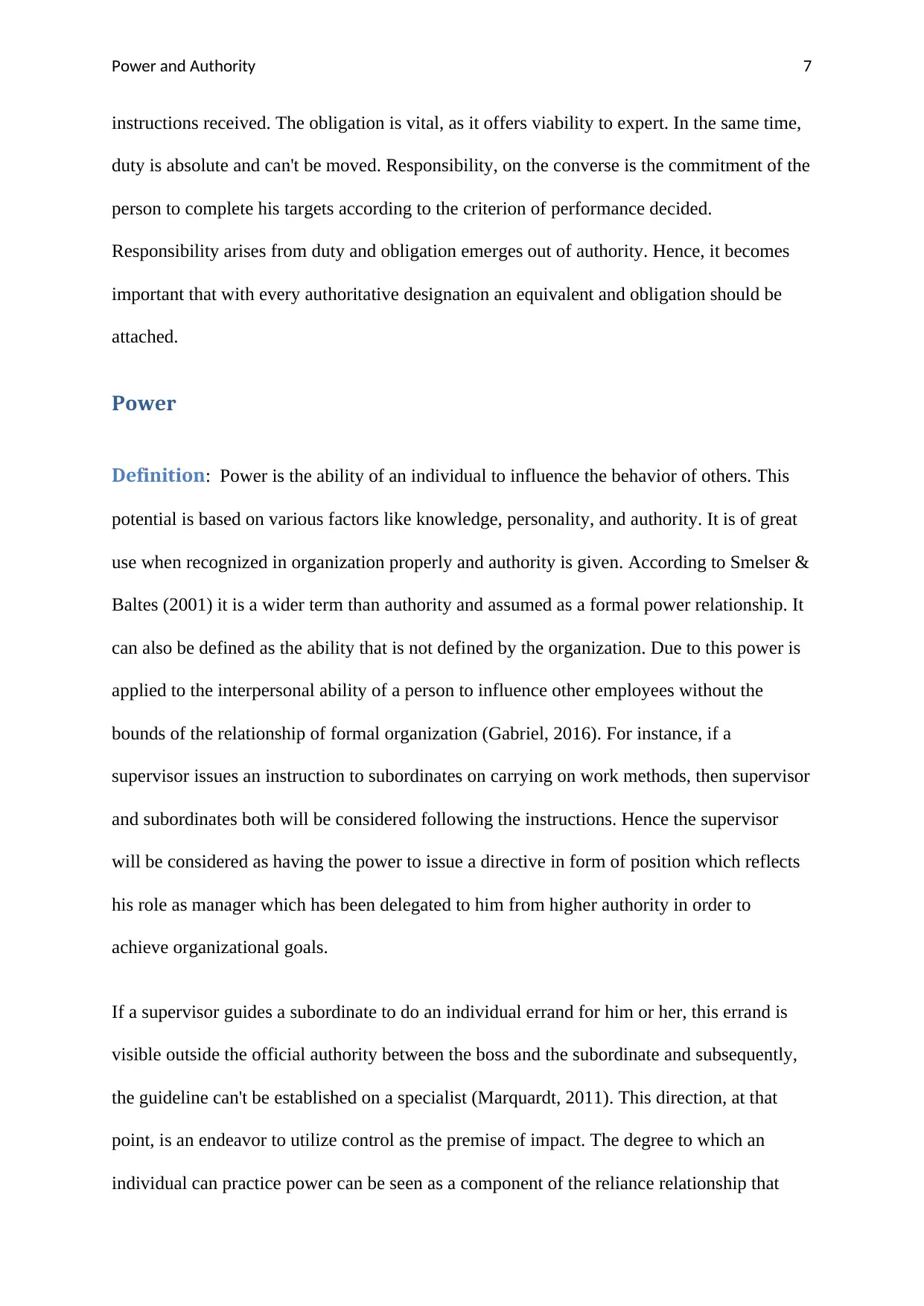
Power and Authority 7
instructions received. The obligation is vital, as it offers viability to expert. In the same time,
duty is absolute and can't be moved. Responsibility, on the converse is the commitment of the
person to complete his targets according to the criterion of performance decided.
Responsibility arises from duty and obligation emerges out of authority. Hence, it becomes
important that with every authoritative designation an equivalent and obligation should be
attached.
Power
Definition: Power is the ability of an individual to influence the behavior of others. This
potential is based on various factors like knowledge, personality, and authority. It is of great
use when recognized in organization properly and authority is given. According to Smelser &
Baltes (2001) it is a wider term than authority and assumed as a formal power relationship. It
can also be defined as the ability that is not defined by the organization. Due to this power is
applied to the interpersonal ability of a person to influence other employees without the
bounds of the relationship of formal organization (Gabriel, 2016). For instance, if a
supervisor issues an instruction to subordinates on carrying on work methods, then supervisor
and subordinates both will be considered following the instructions. Hence the supervisor
will be considered as having the power to issue a directive in form of position which reflects
his role as manager which has been delegated to him from higher authority in order to
achieve organizational goals.
If a supervisor guides a subordinate to do an individual errand for him or her, this errand is
visible outside the official authority between the boss and the subordinate and subsequently,
the guideline can't be established on a specialist (Marquardt, 2011). This direction, at that
point, is an endeavor to utilize control as the premise of impact. The degree to which an
individual can practice power can be seen as a component of the reliance relationship that
instructions received. The obligation is vital, as it offers viability to expert. In the same time,
duty is absolute and can't be moved. Responsibility, on the converse is the commitment of the
person to complete his targets according to the criterion of performance decided.
Responsibility arises from duty and obligation emerges out of authority. Hence, it becomes
important that with every authoritative designation an equivalent and obligation should be
attached.
Power
Definition: Power is the ability of an individual to influence the behavior of others. This
potential is based on various factors like knowledge, personality, and authority. It is of great
use when recognized in organization properly and authority is given. According to Smelser &
Baltes (2001) it is a wider term than authority and assumed as a formal power relationship. It
can also be defined as the ability that is not defined by the organization. Due to this power is
applied to the interpersonal ability of a person to influence other employees without the
bounds of the relationship of formal organization (Gabriel, 2016). For instance, if a
supervisor issues an instruction to subordinates on carrying on work methods, then supervisor
and subordinates both will be considered following the instructions. Hence the supervisor
will be considered as having the power to issue a directive in form of position which reflects
his role as manager which has been delegated to him from higher authority in order to
achieve organizational goals.
If a supervisor guides a subordinate to do an individual errand for him or her, this errand is
visible outside the official authority between the boss and the subordinate and subsequently,
the guideline can't be established on a specialist (Marquardt, 2011). This direction, at that
point, is an endeavor to utilize control as the premise of impact. The degree to which an
individual can practice power can be seen as a component of the reliance relationship that
Paraphrase This Document
Need a fresh take? Get an instant paraphrase of this document with our AI Paraphraser
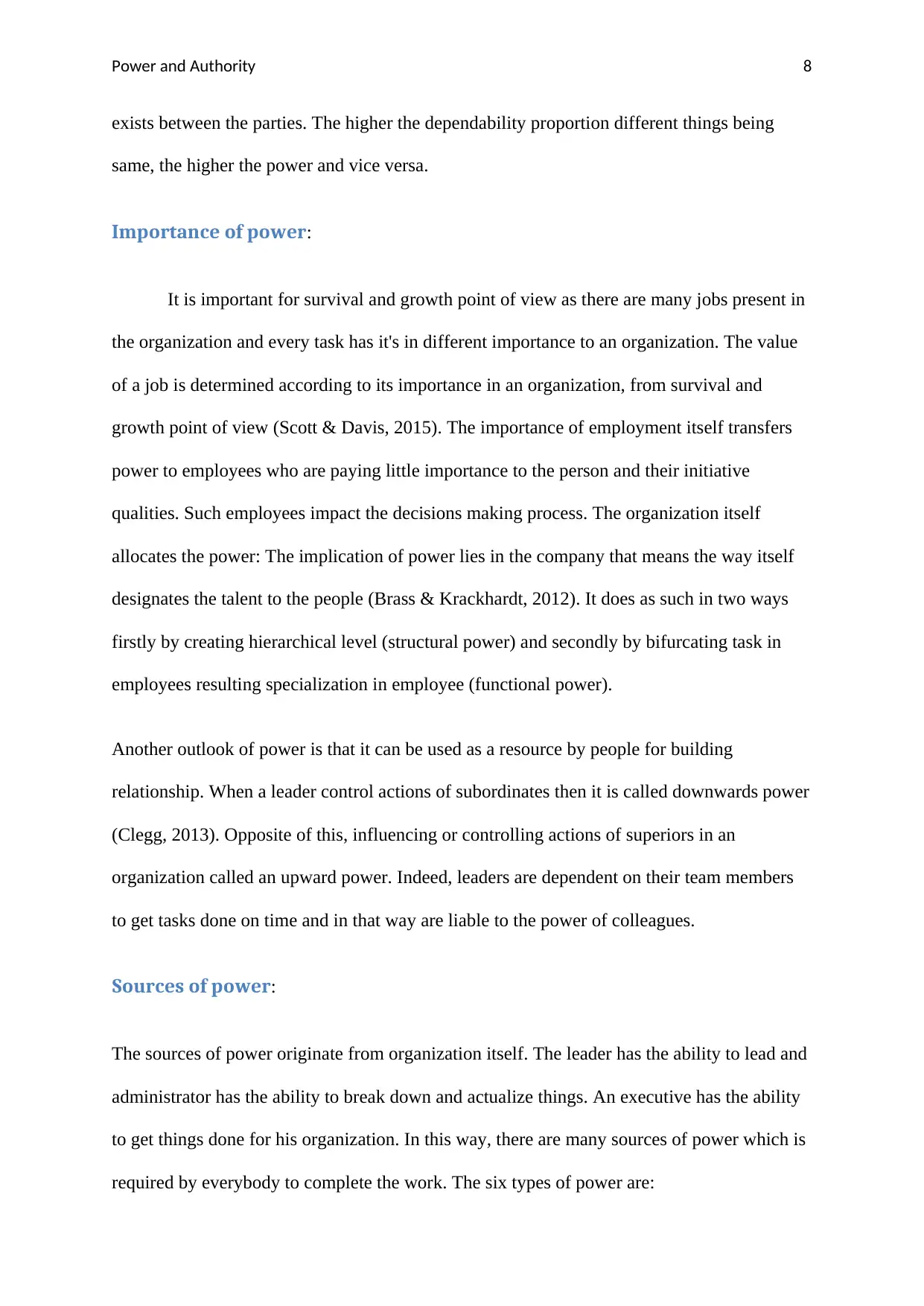
Power and Authority 8
exists between the parties. The higher the dependability proportion different things being
same, the higher the power and vice versa.
Importance of power:
It is important for survival and growth point of view as there are many jobs present in
the organization and every task has it's in different importance to an organization. The value
of a job is determined according to its importance in an organization, from survival and
growth point of view (Scott & Davis, 2015). The importance of employment itself transfers
power to employees who are paying little importance to the person and their initiative
qualities. Such employees impact the decisions making process. The organization itself
allocates the power: The implication of power lies in the company that means the way itself
designates the talent to the people (Brass & Krackhardt, 2012). It does as such in two ways
firstly by creating hierarchical level (structural power) and secondly by bifurcating task in
employees resulting specialization in employee (functional power).
Another outlook of power is that it can be used as a resource by people for building
relationship. When a leader control actions of subordinates then it is called downwards power
(Clegg, 2013). Opposite of this, influencing or controlling actions of superiors in an
organization called an upward power. Indeed, leaders are dependent on their team members
to get tasks done on time and in that way are liable to the power of colleagues.
Sources of power:
The sources of power originate from organization itself. The leader has the ability to lead and
administrator has the ability to break down and actualize things. An executive has the ability
to get things done for his organization. In this way, there are many sources of power which is
required by everybody to complete the work. The six types of power are:
exists between the parties. The higher the dependability proportion different things being
same, the higher the power and vice versa.
Importance of power:
It is important for survival and growth point of view as there are many jobs present in
the organization and every task has it's in different importance to an organization. The value
of a job is determined according to its importance in an organization, from survival and
growth point of view (Scott & Davis, 2015). The importance of employment itself transfers
power to employees who are paying little importance to the person and their initiative
qualities. Such employees impact the decisions making process. The organization itself
allocates the power: The implication of power lies in the company that means the way itself
designates the talent to the people (Brass & Krackhardt, 2012). It does as such in two ways
firstly by creating hierarchical level (structural power) and secondly by bifurcating task in
employees resulting specialization in employee (functional power).
Another outlook of power is that it can be used as a resource by people for building
relationship. When a leader control actions of subordinates then it is called downwards power
(Clegg, 2013). Opposite of this, influencing or controlling actions of superiors in an
organization called an upward power. Indeed, leaders are dependent on their team members
to get tasks done on time and in that way are liable to the power of colleagues.
Sources of power:
The sources of power originate from organization itself. The leader has the ability to lead and
administrator has the ability to break down and actualize things. An executive has the ability
to get things done for his organization. In this way, there are many sources of power which is
required by everybody to complete the work. The six types of power are:
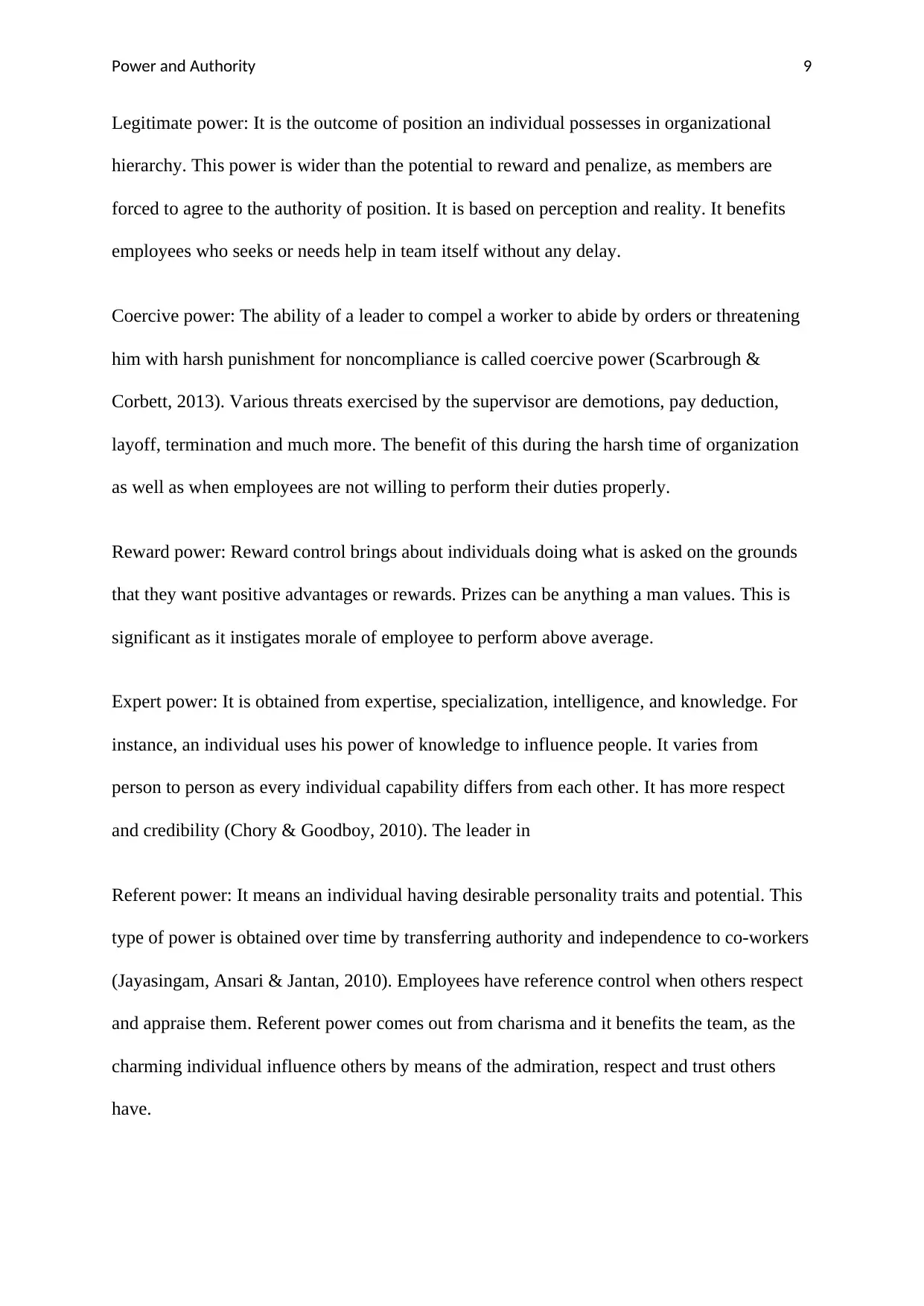
Power and Authority 9
Legitimate power: It is the outcome of position an individual possesses in organizational
hierarchy. This power is wider than the potential to reward and penalize, as members are
forced to agree to the authority of position. It is based on perception and reality. It benefits
employees who seeks or needs help in team itself without any delay.
Coercive power: The ability of a leader to compel a worker to abide by orders or threatening
him with harsh punishment for noncompliance is called coercive power (Scarbrough &
Corbett, 2013). Various threats exercised by the supervisor are demotions, pay deduction,
layoff, termination and much more. The benefit of this during the harsh time of organization
as well as when employees are not willing to perform their duties properly.
Reward power: Reward control brings about individuals doing what is asked on the grounds
that they want positive advantages or rewards. Prizes can be anything a man values. This is
significant as it instigates morale of employee to perform above average.
Expert power: It is obtained from expertise, specialization, intelligence, and knowledge. For
instance, an individual uses his power of knowledge to influence people. It varies from
person to person as every individual capability differs from each other. It has more respect
and credibility (Chory & Goodboy, 2010). The leader in
Referent power: It means an individual having desirable personality traits and potential. This
type of power is obtained over time by transferring authority and independence to co-workers
(Jayasingam, Ansari & Jantan, 2010). Employees have reference control when others respect
and appraise them. Referent power comes out from charisma and it benefits the team, as the
charming individual influence others by means of the admiration, respect and trust others
have.
Legitimate power: It is the outcome of position an individual possesses in organizational
hierarchy. This power is wider than the potential to reward and penalize, as members are
forced to agree to the authority of position. It is based on perception and reality. It benefits
employees who seeks or needs help in team itself without any delay.
Coercive power: The ability of a leader to compel a worker to abide by orders or threatening
him with harsh punishment for noncompliance is called coercive power (Scarbrough &
Corbett, 2013). Various threats exercised by the supervisor are demotions, pay deduction,
layoff, termination and much more. The benefit of this during the harsh time of organization
as well as when employees are not willing to perform their duties properly.
Reward power: Reward control brings about individuals doing what is asked on the grounds
that they want positive advantages or rewards. Prizes can be anything a man values. This is
significant as it instigates morale of employee to perform above average.
Expert power: It is obtained from expertise, specialization, intelligence, and knowledge. For
instance, an individual uses his power of knowledge to influence people. It varies from
person to person as every individual capability differs from each other. It has more respect
and credibility (Chory & Goodboy, 2010). The leader in
Referent power: It means an individual having desirable personality traits and potential. This
type of power is obtained over time by transferring authority and independence to co-workers
(Jayasingam, Ansari & Jantan, 2010). Employees have reference control when others respect
and appraise them. Referent power comes out from charisma and it benefits the team, as the
charming individual influence others by means of the admiration, respect and trust others
have.
⊘ This is a preview!⊘
Do you want full access?
Subscribe today to unlock all pages.

Trusted by 1+ million students worldwide
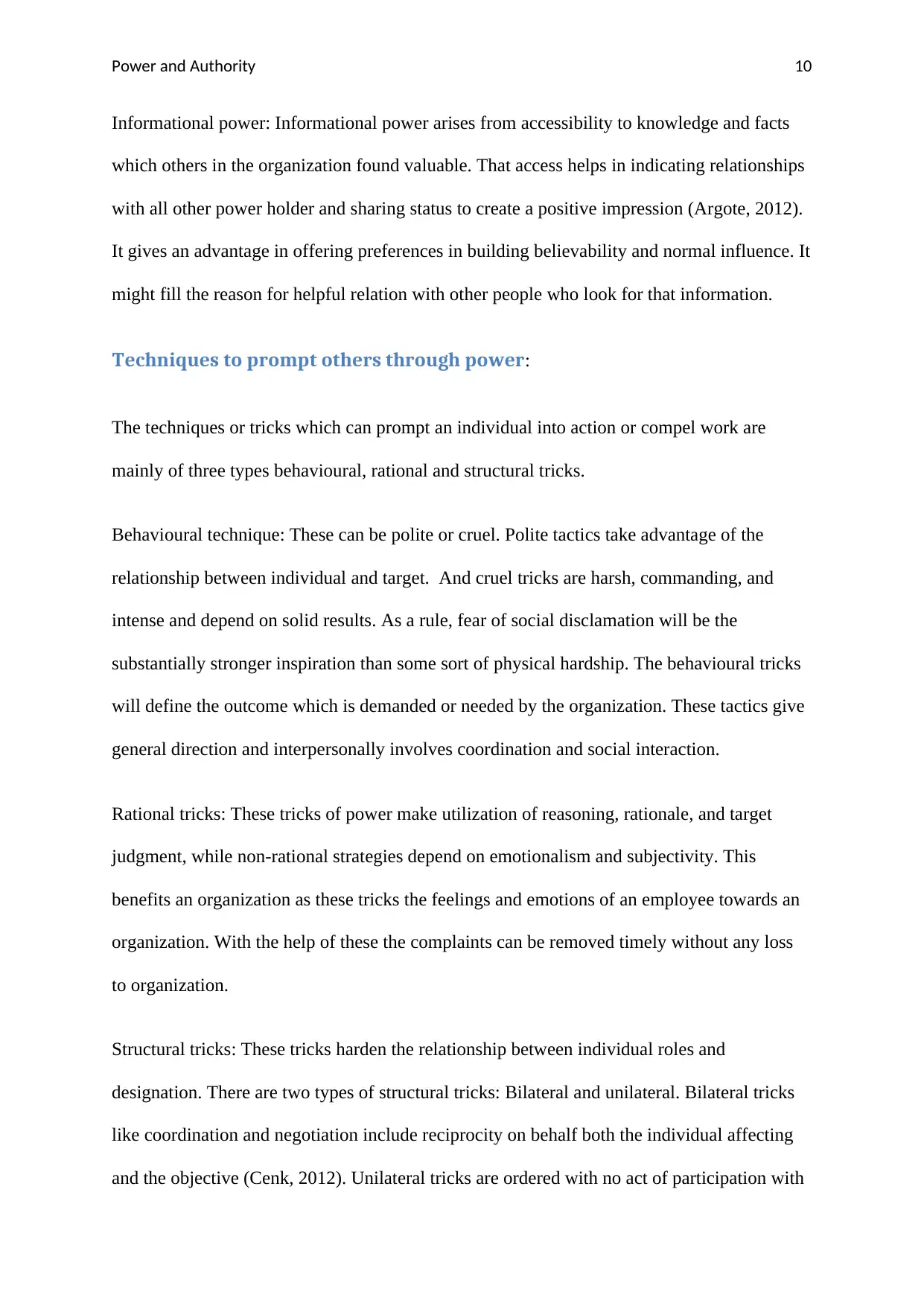
Power and Authority 10
Informational power: Informational power arises from accessibility to knowledge and facts
which others in the organization found valuable. That access helps in indicating relationships
with all other power holder and sharing status to create a positive impression (Argote, 2012).
It gives an advantage in offering preferences in building believability and normal influence. It
might fill the reason for helpful relation with other people who look for that information.
Techniques to prompt others through power:
The techniques or tricks which can prompt an individual into action or compel work are
mainly of three types behavioural, rational and structural tricks.
Behavioural technique: These can be polite or cruel. Polite tactics take advantage of the
relationship between individual and target. And cruel tricks are harsh, commanding, and
intense and depend on solid results. As a rule, fear of social disclamation will be the
substantially stronger inspiration than some sort of physical hardship. The behavioural tricks
will define the outcome which is demanded or needed by the organization. These tactics give
general direction and interpersonally involves coordination and social interaction.
Rational tricks: These tricks of power make utilization of reasoning, rationale, and target
judgment, while non-rational strategies depend on emotionalism and subjectivity. This
benefits an organization as these tricks the feelings and emotions of an employee towards an
organization. With the help of these the complaints can be removed timely without any loss
to organization.
Structural tricks: These tricks harden the relationship between individual roles and
designation. There are two types of structural tricks: Bilateral and unilateral. Bilateral tricks
like coordination and negotiation include reciprocity on behalf both the individual affecting
and the objective (Cenk, 2012). Unilateral tricks are ordered with no act of participation with
Informational power: Informational power arises from accessibility to knowledge and facts
which others in the organization found valuable. That access helps in indicating relationships
with all other power holder and sharing status to create a positive impression (Argote, 2012).
It gives an advantage in offering preferences in building believability and normal influence. It
might fill the reason for helpful relation with other people who look for that information.
Techniques to prompt others through power:
The techniques or tricks which can prompt an individual into action or compel work are
mainly of three types behavioural, rational and structural tricks.
Behavioural technique: These can be polite or cruel. Polite tactics take advantage of the
relationship between individual and target. And cruel tricks are harsh, commanding, and
intense and depend on solid results. As a rule, fear of social disclamation will be the
substantially stronger inspiration than some sort of physical hardship. The behavioural tricks
will define the outcome which is demanded or needed by the organization. These tactics give
general direction and interpersonally involves coordination and social interaction.
Rational tricks: These tricks of power make utilization of reasoning, rationale, and target
judgment, while non-rational strategies depend on emotionalism and subjectivity. This
benefits an organization as these tricks the feelings and emotions of an employee towards an
organization. With the help of these the complaints can be removed timely without any loss
to organization.
Structural tricks: These tricks harden the relationship between individual roles and
designation. There are two types of structural tricks: Bilateral and unilateral. Bilateral tricks
like coordination and negotiation include reciprocity on behalf both the individual affecting
and the objective (Cenk, 2012). Unilateral tricks are ordered with no act of participation with
Paraphrase This Document
Need a fresh take? Get an instant paraphrase of this document with our AI Paraphraser
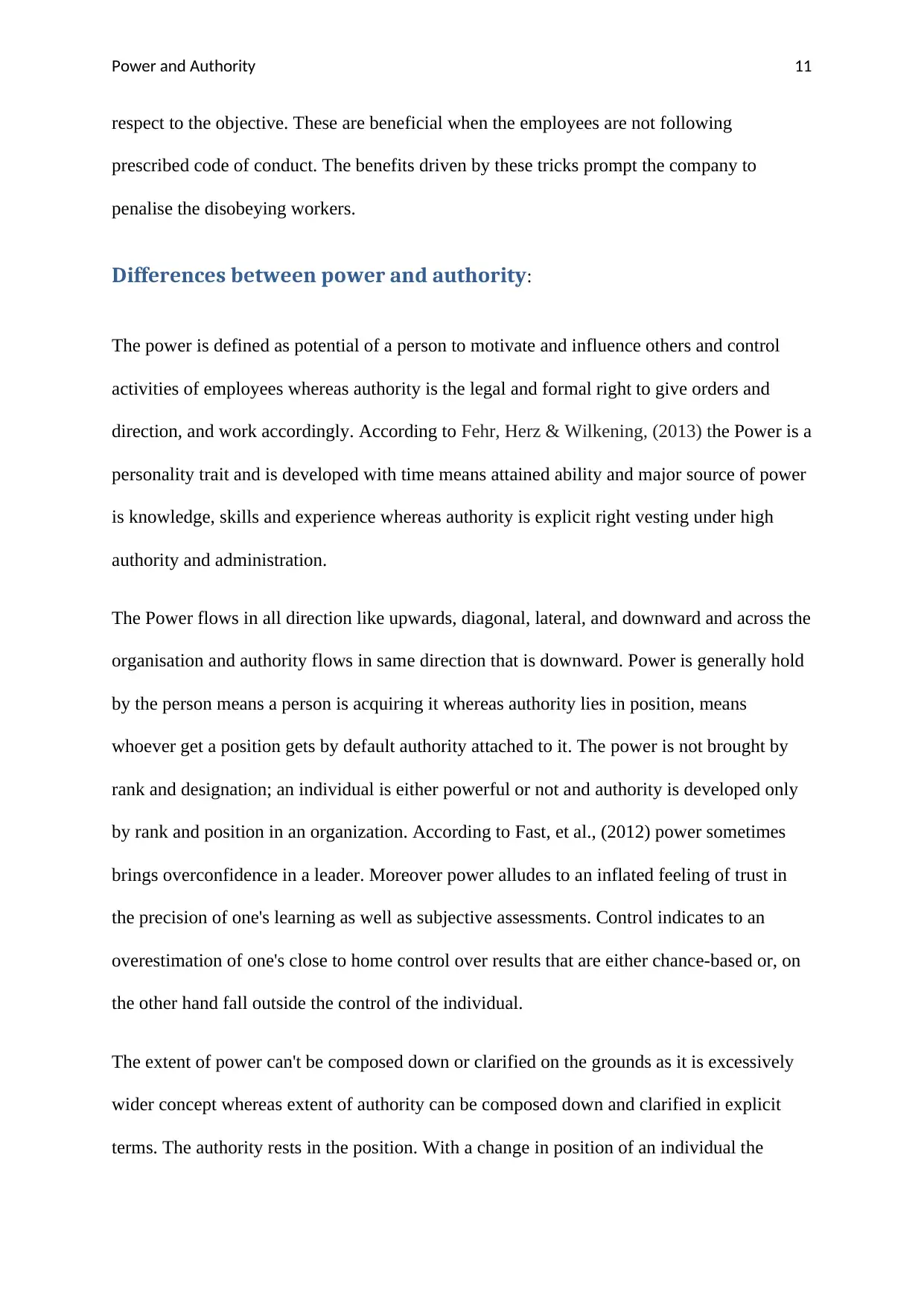
Power and Authority 11
respect to the objective. These are beneficial when the employees are not following
prescribed code of conduct. The benefits driven by these tricks prompt the company to
penalise the disobeying workers.
Differences between power and authority:
The power is defined as potential of a person to motivate and influence others and control
activities of employees whereas authority is the legal and formal right to give orders and
direction, and work accordingly. According to Fehr, Herz & Wilkening, (2013) the Power is a
personality trait and is developed with time means attained ability and major source of power
is knowledge, skills and experience whereas authority is explicit right vesting under high
authority and administration.
The Power flows in all direction like upwards, diagonal, lateral, and downward and across the
organisation and authority flows in same direction that is downward. Power is generally hold
by the person means a person is acquiring it whereas authority lies in position, means
whoever get a position gets by default authority attached to it. The power is not brought by
rank and designation; an individual is either powerful or not and authority is developed only
by rank and position in an organization. According to Fast, et al., (2012) power sometimes
brings overconfidence in a leader. Moreover power alludes to an inflated feeling of trust in
the precision of one's learning as well as subjective assessments. Control indicates to an
overestimation of one's close to home control over results that are either chance-based or, on
the other hand fall outside the control of the individual.
The extent of power can't be composed down or clarified on the grounds as it is excessively
wider concept whereas extent of authority can be composed down and clarified in explicit
terms. The authority rests in the position. With a change in position of an individual the
respect to the objective. These are beneficial when the employees are not following
prescribed code of conduct. The benefits driven by these tricks prompt the company to
penalise the disobeying workers.
Differences between power and authority:
The power is defined as potential of a person to motivate and influence others and control
activities of employees whereas authority is the legal and formal right to give orders and
direction, and work accordingly. According to Fehr, Herz & Wilkening, (2013) the Power is a
personality trait and is developed with time means attained ability and major source of power
is knowledge, skills and experience whereas authority is explicit right vesting under high
authority and administration.
The Power flows in all direction like upwards, diagonal, lateral, and downward and across the
organisation and authority flows in same direction that is downward. Power is generally hold
by the person means a person is acquiring it whereas authority lies in position, means
whoever get a position gets by default authority attached to it. The power is not brought by
rank and designation; an individual is either powerful or not and authority is developed only
by rank and position in an organization. According to Fast, et al., (2012) power sometimes
brings overconfidence in a leader. Moreover power alludes to an inflated feeling of trust in
the precision of one's learning as well as subjective assessments. Control indicates to an
overestimation of one's close to home control over results that are either chance-based or, on
the other hand fall outside the control of the individual.
The extent of power can't be composed down or clarified on the grounds as it is excessively
wider concept whereas extent of authority can be composed down and clarified in explicit
terms. The authority rests in the position. With a change in position of an individual the
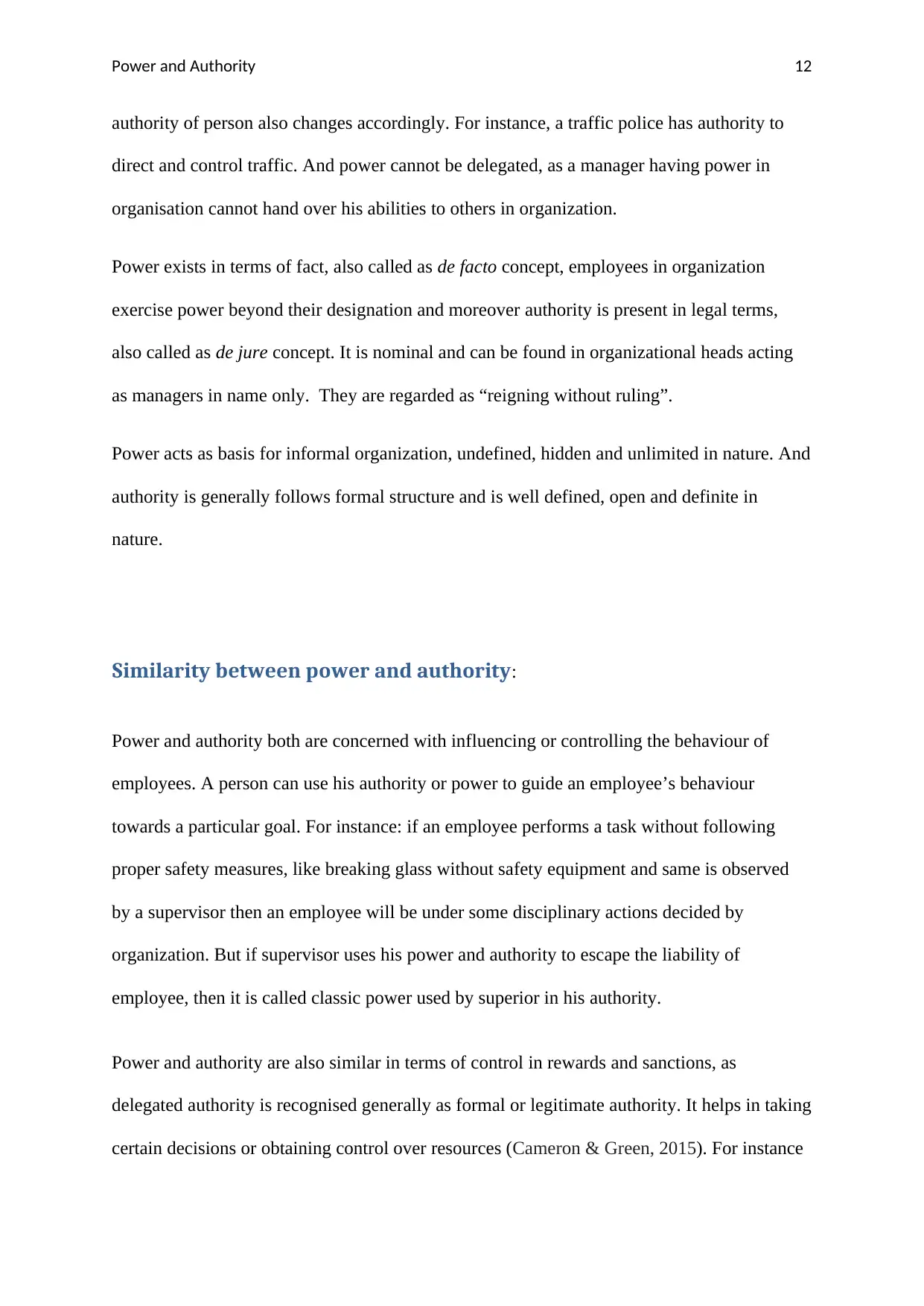
Power and Authority 12
authority of person also changes accordingly. For instance, a traffic police has authority to
direct and control traffic. And power cannot be delegated, as a manager having power in
organisation cannot hand over his abilities to others in organization.
Power exists in terms of fact, also called as de facto concept, employees in organization
exercise power beyond their designation and moreover authority is present in legal terms,
also called as de jure concept. It is nominal and can be found in organizational heads acting
as managers in name only. They are regarded as “reigning without ruling”.
Power acts as basis for informal organization, undefined, hidden and unlimited in nature. And
authority is generally follows formal structure and is well defined, open and definite in
nature.
Similarity between power and authority:
Power and authority both are concerned with influencing or controlling the behaviour of
employees. A person can use his authority or power to guide an employee’s behaviour
towards a particular goal. For instance: if an employee performs a task without following
proper safety measures, like breaking glass without safety equipment and same is observed
by a supervisor then an employee will be under some disciplinary actions decided by
organization. But if supervisor uses his power and authority to escape the liability of
employee, then it is called classic power used by superior in his authority.
Power and authority are also similar in terms of control in rewards and sanctions, as
delegated authority is recognised generally as formal or legitimate authority. It helps in taking
certain decisions or obtaining control over resources (Cameron & Green, 2015). For instance
authority of person also changes accordingly. For instance, a traffic police has authority to
direct and control traffic. And power cannot be delegated, as a manager having power in
organisation cannot hand over his abilities to others in organization.
Power exists in terms of fact, also called as de facto concept, employees in organization
exercise power beyond their designation and moreover authority is present in legal terms,
also called as de jure concept. It is nominal and can be found in organizational heads acting
as managers in name only. They are regarded as “reigning without ruling”.
Power acts as basis for informal organization, undefined, hidden and unlimited in nature. And
authority is generally follows formal structure and is well defined, open and definite in
nature.
Similarity between power and authority:
Power and authority both are concerned with influencing or controlling the behaviour of
employees. A person can use his authority or power to guide an employee’s behaviour
towards a particular goal. For instance: if an employee performs a task without following
proper safety measures, like breaking glass without safety equipment and same is observed
by a supervisor then an employee will be under some disciplinary actions decided by
organization. But if supervisor uses his power and authority to escape the liability of
employee, then it is called classic power used by superior in his authority.
Power and authority are also similar in terms of control in rewards and sanctions, as
delegated authority is recognised generally as formal or legitimate authority. It helps in taking
certain decisions or obtaining control over resources (Cameron & Green, 2015). For instance
⊘ This is a preview!⊘
Do you want full access?
Subscribe today to unlock all pages.

Trusted by 1+ million students worldwide
1 out of 18
Related Documents
Your All-in-One AI-Powered Toolkit for Academic Success.
+13062052269
info@desklib.com
Available 24*7 on WhatsApp / Email
![[object Object]](/_next/static/media/star-bottom.7253800d.svg)
Unlock your academic potential
Copyright © 2020–2026 A2Z Services. All Rights Reserved. Developed and managed by ZUCOL.





